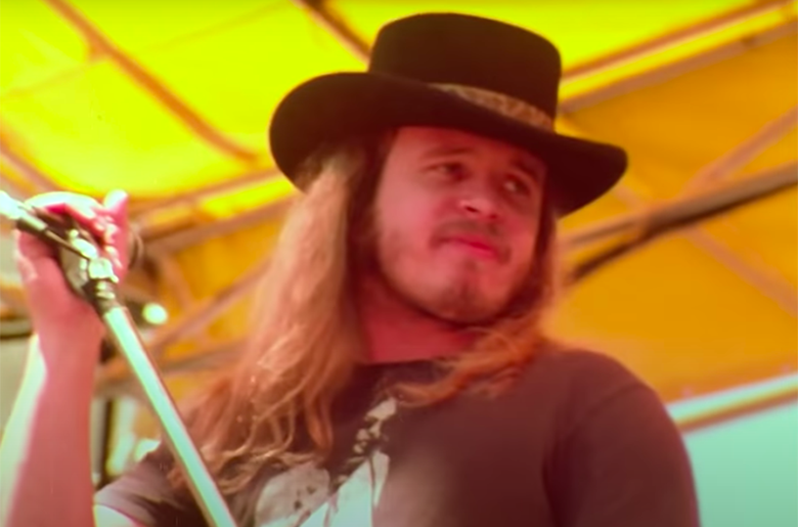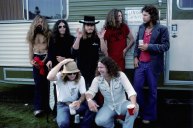Much like Merle Haggard's "Okie From Muskogee," Lynyrd Skynyrd's "Sweet Home Alabama" gets interpreted two very different ways.
Some hear both Haggard and Skynyrd lead singer Ronnie Van Zant as champions of ways of living and schools of thought in danger of being lost to political correctness. Others hear both men poking fun at their own complicated identities: The Hag as an Oklahoman and Van Zant as a son of the South.
"Sweet Home Alabama," the first song on the classic rock legends' 1974 album Second Helping, deserves a deeper look because, unlike Haggard's ramblings of a local yokel, Van Zant hits on some major controversies, from Alabama Gov. George Wallace's segregationist stances a decade prior to the Watergate scandal that took down President Richard Nixon. Plus, "Sweet Home Alabama" is unquestionably an answer song to two Neil Young cuts, "Southern Man" and "Alabama."
Skynyrd's reference to Wallace is followed by a chorus of "boo, boo, boo." It seems like a tongue-in-cheek takedown of still prevalent attitudes that Alabama's only populated by rednecks, all the day down to Van Zant's ad-libbed "endorsement" of the State of Alabama's lawmakers, "Montgomery's got the answer."
In Lee Ballinger's Lynyrd Skynyrd: An Oral History, "Sweet Home Alabama" producer Al Kooper points to another line as proof that the band opposed Wallace.
"The line 'We all did what we could do' is sort of ambiguous," Kooper says. "'We tried to get Wallace out of there' is how I always thought of it."
Guitarist Ed King, Van Zant and guitarist Gary Rossington's "Sweet Home Alabama" co-writer, tells a much different story about a song that inspired Wallace to appoint Skynyrd as members of the Alabama State Militia.
"I can understand where the 'boo boo boo' would be misunderstood," King wrote in 2009 on his website's message board. "It's not US going 'boo' ... it's what the Southern man hears the Northern man say every time the Southern man'd say 'In Birmingham we love the gov'nor'. Get it? 'We all did what WE could do!' to get Wallace elected. It's not a popular opinion but Wallace stood for the average white guy in the South."
"Watergate does not bother me. Does your conscience bother you?" seems to defend Van Zant's fellow progressive Southerners. A Southern rock band that went on to back gun control ("Mr. Saturday Night Special") and saving the environment ("All I Can Do Is Write About It") took pause in its biggest song to point out that the South didn't have the market cornered on rotten politicians.
As the website Shmoop puts it, "Van Zant ...wasn't judging all individual Northerners to be bad people because their president had committed bad acts; they shouldn't judge him for the things George Wallace did either."
As for "I heard Mister Young sing about her, I heard Ol' Neil put her down," the band challenges a couple of Young's songs that paint the South with a broad, condescending stroke.
"We thought Neil was shooting all the ducks in order to kill one or two," Van Zant told Glide (as quoted by Neil Young News). "We're Southern rebels, but more than that, we know the difference between right and wrong."
Still, rumors of a feud between the band and Young seem grossly exaggerated. Any ill feelings would've been short-lived, as Van Zant wearing a Tonight's The Night t-shirt on 1977 album Street Survivor's cover and on stage that year at the Oakland Coliseum comes across as a genuine show of support for a fellow rocker.
Further, in Young's 2012 autobiography Waging Heavy Peace, he speaks glowingly of "Sweet Home Alabama" while putting down a personal misstep.
"My own song 'Alabama' richly deserved the shot Lynyrd Skynyrd gave me with their great record," Young wrote. "I don't like my words when I listen to it. They are accusatory and condescending, not fully thought out, and too easy to misconstrue."
Lastly, the reason a rock 'n' roll band from Jacksonville, Florida got so fixated on Alabama was because the group got to record early career demos (circa 1971-'72) in Southern music (a synonym for Black music) hotbed Muscle Shoals.
The backup singers on "Sweet Home Alabama" were Merry Clayton (sister of Little Feat's Sam Clayton and Mick Jagger's duet partner on the Rolling Stones' "Gimme Shelter") and legendary R&B vocalist Clydie King. Both women happened to be African-American, and it's a stretch to believe that they would've sang on an anthem about someone else's "heritage."
In a 2013 interview with AV Club, Clayton said she hesitated to take the gig because of the song's title.
"[Clydie King] said the song was 'Sweet Home Alabama.' There was a silence on the phone for quite a while," Clayton said. "I said, 'Clydie, are you serious? I'm not singing nothing about nobody's sweet home Alabama. Period.'"
Clayton took the gig to "let the music be [her] protest." Fitting, as a song many view as championing Southern stereotypes might have actually allowed Skynyrd to lash back at how regional biases erase the experiences of progressive-minded artists.
Read More: Remembering Lynyrd Skynyrd's 1977 Plane Crash, a Southern Rock Tragedy
Touchstone Pictures and director Andy Tennant used the title Sweet Home Alabama for something way less heavy—a 2002 box office success starring Reese Witherspoon as Melanie Carmichael, an Alabama-born tastemaker in New York City who's destined to marry childhood sweetheart Jake Perry (played by actor Josh Lucas).




